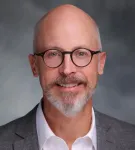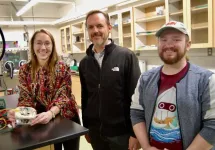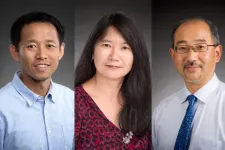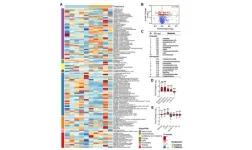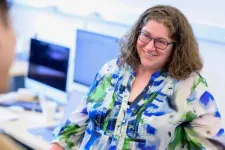Heart regeneration pioneer to join UW–Madison, Morgridge Institute
2024-04-09
(Press-News.org)
04/09/2024
CONTACT: Deneen Wellik, wellik@wisc.edu
Heart regeneration pioneer to join UW–Madison, Morgridge Institute
MADISON — A biologist who explores the potential life-saving mechanisms of how organisms regenerate damaged heart and spinal cord tissue will join the University of Wisconsin–Madison and the Morgridge Institute for Research this fall.
Kenneth Poss, presently the James B. Duke Professor of Regenerative Biology at Duke University, explores a research area that has grown tremendously in the years following James Thomson’s landmark discoveries in human stem cells. With Thomson’s retirement in 2022, the School of Medicine and Public Health at UW–Madison and Morgridge teamed together to recruit another international leader to bolster Wisconsin’s leadership in this biomedically important field.
“We are delighted to partner with the Morgridge Institute in the recruitment of an internationally renowned leader in stem cell research,” says Robert N. Golden, dean of the School of Medicine and Public Health. “We look forward to having Ken Poss join the vibrant group of scientists on our campus who are tirelessly focused on advancing the field of stem cell and regenerative medicine.”
Poss studies the mystery of how some animal species are capable of regenerating virtually any damaged tissue in their body. The Poss Lab uses zebrafish, a model species that is uniquely suited to reveal mechanisms of regeneration. He was the first to demonstrate heart muscle regeneration in this model organism in response to injuries that would be lethal to mammals, including humans.
While Poss mainly investigates the fundamental rules of organ regeneration in zebrafish, the work raises exciting questions about whether similar capabilities could one day be unlocked in humans. Human heart tissue damaged by heart attacks is unable to repair and regenerate, leading to scarring and often debilitating loss of function for millions of people.
Based on recent discoveries in the Poss lab and others globally, medical applications for heart repair are quickly becoming a question not of “if,” but of “when.”
The Poss Lab published work in 2023 that showed that genetic “enhancer elements” that switch on regeneration programs in zebrafish, which they had discovered years before, can also work in mammals. These enhancer elements are capable of guiding repair of damaged tissue in studies in mice and pigs. Most importantly, Poss says, the regeneration responses were restricted just to the injury site, and the enhancers shut down naturally over time.
“It’s a strong proof-of-concept study,” Poss says. “Factors that can turn on regeneration are often very potent factors that if mutated or over-expressed could cause cancer. We will need to engineer them in ways that will have the very tightest control only in a specific cell type for a specific time.”
Poss, a native of Green Bay, says coming to Madison opens a range of exciting possibilities for advancing regenerative biology. The breadth of UW–Madison’s excellence is already a big draw, he says, with 100-plus labs that are actively involved in regenerative, stem cell and developmental biology. In addition, he looks forward to leading recruitment of new faculty positions in regenerative biology and training the next generation of graduate students and postdocs in the field.
While his lab will be housed at Morgridge, a private nonprofit research institute that partners with UW–Madison, his academic home will be the Department of Cell and Regenerative Biology in the School of Medicine and Public Health.
“I think that this community will be very competitive for creating a national center for studying tissue regeneration,” says Poss, who co-founded the International Society for Regenerative Biology in 2021. “There will be more ways to make our strengths clear to everyone. I hope my role will be to help crystallize and get more people excited about this field.”
Deneen Wellik, chair of cell and regenerative biology, says Poss is coming to Madison at a great time. Research in past decades in developmental and stem cell biology has greatly increased our understanding of how tissues develop normally. This research has led to deep connections to regenerative biology — turning attention to how these cells can be coaxed to re-engage in these processes to promote repair and regeneration.
“UW–Madison in general, and our department specifically, has invested significant resources in recent years to hiring faculty in the regenerative biology field,” Wellik says. “To have added such an outstanding leader will amplify our strength in this field and augment continued growth at UW–Madison. Further, expertise in imaging and genomics at UW-Madison will complement advances in regenerative biology.”
Morgridge CEO Brad Schwartz says that when Thomson retired in 2022, the institute prioritized bringing in a major scientific leader who could provide a spark to this burgeoning field. Poss was the ideal candidate, not just as a great scientist but as someone who wants to build community and strengthen the whole of his field, he says.
“At Morgridge we are very committed to curiosity-driven research and fundamental mechanisms of biology, and that is really attractive to Ken,” Schwartz adds. “Because that’s how he got to where he is today, by following these intrinsically fascinating questions.”
Poss earned his Ph.D. at the Massachusetts Institute of Technology (MIT) in 1998 and has been on the faculty at Duke University since 2003. Growing up in Green Bay, Poss is a huge Packers fan and as a kid he spent part of his summers serving food and cleaning dishes at Packers training camp. “That was probably my most prestigious job,” he quips.
END
ELSE PRESS RELEASES FROM THIS DATE:
2024-04-09
Algorithms were supposed to make our lives easier and fairer: help us find the best job applicants, help judges impartially assess the risks of bail and bond decisions, and ensure that healthcare is delivered to the patients with the greatest need. By now, though, we know that algorithms can be just as biased as the human decision-makers they inform and replace.
What if that weren’t a bad thing?
New research by Carey Morewedge, a Boston University Questrom School of Business professor of marketing and Everett W. Lord Distinguished Faculty Scholar, found that people recognize more of their biases in algorithms’ decisions ...
2024-04-09
Today wirelessly connected devices are performing an expanding array of applications, such as monitoring the condition of engines and machinery and remote sensing in agricultural settings. Systems known as the “Internet of Things” (IoT), hold much potential for improving the efficiency and safety of the equipment.
Yet stumbling blocks remain for IoT, thwarting many potential applications. How do you power these devices in situations where and when reliable electrical sources are not practically available?
Research from the University of Utah’s College of Engineering points to a possible solution in the form of a novel type of battery called ...
2024-04-09
SAN DIEGO – As part of a comprehensive effort to improve cancer screenings among diverse communities, Penn Medicine’s Abramson Cancer Center (ACC) Community Outreach and Engagement team developed a culturally sensitive educational video to address prostate cancer screening disparities. In findings shared today at the American Association for Cancer Research (AACR) Annual Meeting 2024 (Abstract LB371), the team showed that the video increased knowledge about prostate cancer and screening, and reduced uncertainty about obtaining prostate ...
2024-04-09
SAN DIEGO – A video designed to educate Black men about prostate cancer resulted in 97% of surveyed participants acknowledging that Black men are at a higher risk of this disease and 93% saying they would get screened, according to a study presented at the American Association for Cancer Research (AACR) Annual Meeting 2024, held April 5-10.
Black men have the highest incidence of prostate cancer in the United States with 184.2 new cases per 100,000 people compared to white men with 111.5 new cases per 100,000 people, according to the National Cancer Institute’s Surveillance, ...
2024-04-09
(MEMPHIS, Tenn. – April 9, 2024) Scientists from St. Jude Children’s Research Hospital today announced the St. Jude survivorship portal — the first data portal for sharing, analyzing and visualizing pediatric cancer survivorship data. Details on the portal and its ability to facilitate breakthroughs in pediatric cancer survivorship research were published today in Cancer Discovery, a journal of the American Association for Cancer Research.
The survivorship portal is a big-data platform that incorporates clinical and genomic information, creating an unprecedented research system. The portal integrates three dimensions ...
2024-04-09
Just as in Brazil drivers can be warned of traffic congestion ahead or a vehicle parked on the hard shoulder, notifications may soon pop up on their smartphone or on their car’s computer screen to warn them in real time that an anteater, wolf or tapir is crossing the highway. No human will necessarily need to see the animal in question or press a control button to send the warning.
For this to be possible, a key step is construction of a computer vision model that automatically detects Brazilian wild animals. Researchers ...
2024-04-09
The prevalence of remote work since the start of the Covid-19 pandemic has significantly changed urban transportation patterns in the U.S., according to new study led by MIT researchers.
The research finds significant variation between the effects of remote work on vehicle miles driven and on mass-transit ridership across the U.S.
“A 1 percent decrease in onsite workers leads to a roughly 1 percent reduction in [automobile] vehicle miles driven, but a 2.3 percent reduction in mass transit ridership,” says Yunhan Zheng SM ’21, PhD ’24, an MIT postdoc who is co-author of the study.
“This is one of the first studies that identifies the causal effect ...
2024-04-09
Irvine, Calif., April 9, 2024 — A University of California, Irvine-led team reveals a clear link between human-driven climate change and the years-long drought currently gripping southern Madagascar. Their study appears in the Nature journal Climate and Atmospheric Science.
“Using remotely sensed observations and climate models, we could see evidence that climate change is affecting the hydrological cycle in southern Madagascar, and it’s likely going to have big implications for the people that live there and how they grow their food,” ...
2024-04-09
“[...] CMS121 applicability could be expanded from a geroneuroprotector drug to a metabolic drug [...]”
BUFFALO, NY- April 9, 2024 – A new research paper was published in Aging (listed by MEDLINE/PubMed as "Aging (Albany NY)" and "Aging-US" by Web of Science) Volume 16, Issue 6, entitled, “CMS121: a novel approach to mitigate aging-related obesity and metabolic dysfunction.”
Modulated by differences in genetic and environmental factors, laboratory mice often show progressive weight gain, eventually leading to obesity and metabolic dyshomeostasis. ...
2024-04-09
About 90% of deaths from cancer are a result of metastasis — that is, from cancer’s ability to spread from an initial primary tumor to seed new tumors throughout the body, often in the lungs, liver, and brain.
And metastasis relies on cancer cells’ ability to adapt to different tissue environments throughout the body by gaining improper access to a variety of playbooks stored in our genetic code — including gene programs that are generally available only during early stages of human development.
Today, researchers at Memorial Sloan Kettering Cancer Center (MSK) are using innovative approaches like single-cell sequencing technology ...
LAST 30 PRESS RELEASES:
[Press-News.org] Heart regeneration pioneer to join UW–Madison, Morgridge Institute
